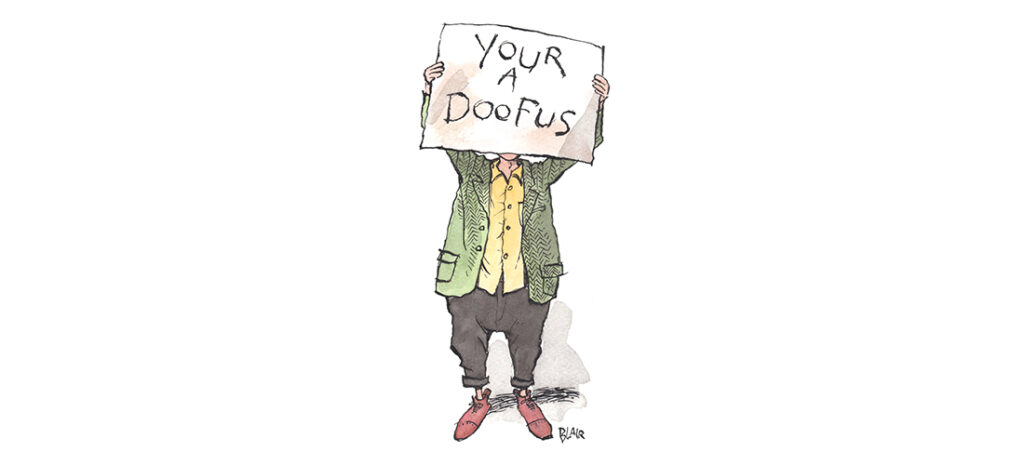O.Henry Ending

Grammar? The Horror!
He’s not silently correcting what you’ve just said in his head
By David Claude Bailey
When people ask me what I do for a living, I tell them I fix other people’s grammar — then explain I’m an editor. Do people tend to get just a bit self conscious about their speech patterns afterwards? Probably, and although I sense them choosing their words just a bit more carefully as they speak, they needn’t. I’m not silently correcting their grammar. I’m what’s referred to among English majors as a descriptive grammar guy. In my rarely humble opinion, prescriptive grammar, which is all about prescribing what’s correct while proscribing errors, is a lost cause. According to a 2016 Huffington Post poll, only 12 percent of respondents complained that improper grammar in a text message would bother them “a lot,” with 53 percent of respondents being bothered “somewhat” or “not very much.” Thirty percent responded that bad grammar bothered them “not at all.”
I saw that coming decades ago when I taught English and Latin at Salem Academy, where I’d scribble on students’ papers in red ink, “Not spelled that way — yet — but keep on trying.”
Language evolves, changing hourly. (By the minute on the internet.) In certain historical eras, scholars tell us, it’s far more plastic. Methinks ours is one of them.
According to the History Channel, Shakespeare’s name was spelled more than 80 different ways during his lifetime — including Shaxberd — my favorite. The HC goes on to point out that the Bard himself “never spelled his name ‘William Shakespeare.’” Instead his John Henry spilled onto paper as “Willm Shakp,” “Willm Shakspere” and “William Shakspeare.” So, according to the man who didn’t worry about spelling bee or not to be, we’ve been misspelling his name for centuries. That was, of course, before Samuel Johnson attempted to impose standard spelling and grammar on his fellow Brits with the 1775 publication of his Dictionary of the English Language.
But back to our time. Let’s just tackle “to boldly go where no one has gone before,” my Klingon friends. OMG! Captain Kirk split an infinitive — a faux pas worse than splitting some of those tetchy molecules on the atomic chart. He put the adverb “boldly” between the “to” and the “go” of the infinitive form. I myself was attacked fiercely by a religion prof at Wake Forest during my master’s oral exam for that very crime. That, however, is based on the Victorian world’s worship of the Romans and Latin grammar, where splitting verbs was anathema. But let’s not split hairs about it.
And how about who/whom? For years, I’ve avoided “whom” in most sentences in O.Henry magazine. Why? Because I firmly believe something like half of our readers stop and wonder whether “whom” is right in any usage, while the other half come to a dead stop parsing the sentence and losing sight of the story.
Yes, I hear you, grammar grannies and grandpas. Sometimes I’m one of you. My pet peeve, which sometimes has me shouting at my radio during All Things Considered, is the use of “and” for “to” with infinitives, as in “I’ll try and use correct grammar.” In a grammatically perfect world, one would say, “I’ll try to use correct grammar.”
But does anyone really have trouble understanding the former? Does looking down at others’ speech elevate my social station or makes me feel superior and more educated than others? “Guilty,” I say. If you’ve read this far, you probably have your own peeve. “Would of,” “could of,” “should of”? The Oxford comma, which the Associated Press and this magazine abjure? If you were an English major, it might be the waning of the subjunctive mood. How about the conflating of its, it’s/ your, you’re/ they’re, there and their? The apostrophe is dying, folks, but the language isn’t.
I like to compare what’s going on with grammar to what’s happened to Auguste Escoffier’s haute cuisine, once rigidly taught and slavishly followed in the finest restaurants. Now, fusion, the mixing of dishes from different cultures, is all the rage. In our melting pot of polyglot with English being universally accepted as the internet’s lingua franca, “standard” American English is getting fused, bruised and misused. And we might as well embrace it.
So, fellow grammar geeks, I say that it’s over, and it’s high time to boldly go where no language has gone before. OH
David Claude Bailey is a contributing editor to O.Henry. If you want to question or amend his grammar, mail him your corrections on the back of a $1,000 bill.
